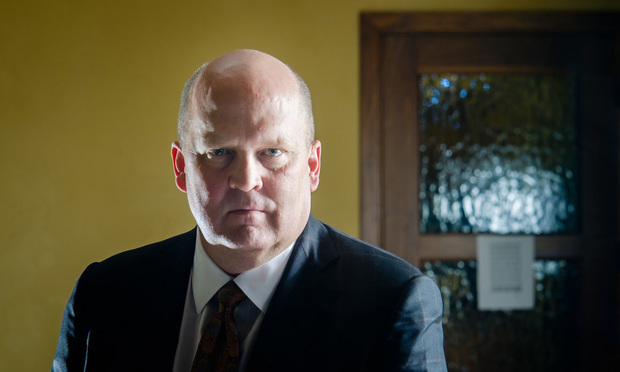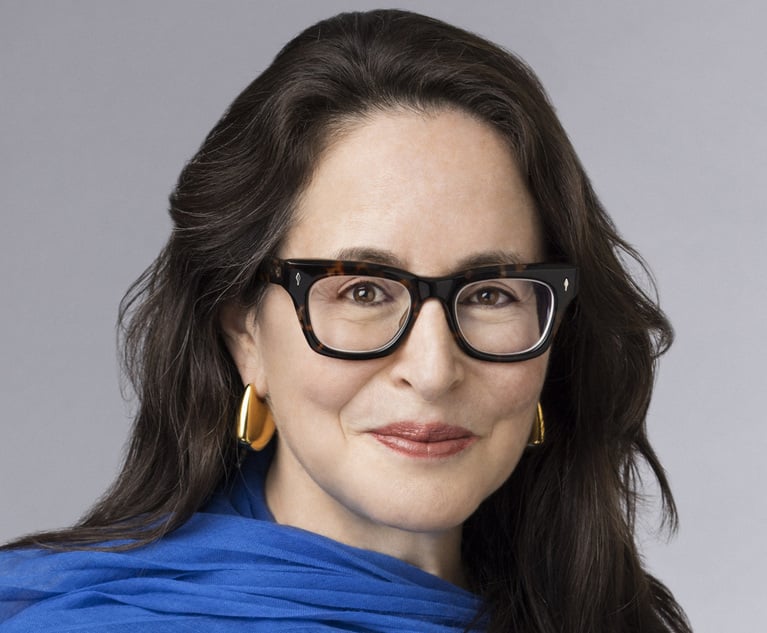Lawyers Duel Over $503M Fee Award in Syngenta Corn Settlement
Lawyers from 15 law firms, including Texas plaintiffs attorney Mikal Watts, tussled in court Monday over who should get what in the GMO corn settlement with Syngenta.
December 17, 2018 at 07:50 PM
5 minute read
 Mikal Watts, partner at Watts Guerra. Photo: Mark Sobhani Photography
Mikal Watts, partner at Watts Guerra. Photo: Mark Sobhani Photography
Lawyers from 15 law firms, including Texas plaintiffs attorney Mikal Watts, tussled in court Monday over who should get what from a $503 million fee award in the GMO corn settlement with Syngenta.
U.S. District Judge John Lungstrum of the District of Kansas, who approved the $1.5 billion class action settlement in an order earlier this month, heard objections to a special master's report and recommendation that allocated fees to about 400 law firms. The settlement, approved in the multidistrict litigation in Kansas, resolved lawsuits alleging that Syngenta sold genetically modified corn seed that China refused to import, causing about 600,000 farmers and other producers to lose billions of dollars.
The dispute mirrors similar fee fights that have erupted in mass torts between plaintiffs attorneys appointed to represent the class and those who have brought individual suits on behalf of their clients. But the Syngenta litigation also progressed in three separate venues, with U.S. District Judge David Herndon of the Southern District of Illinois and Minnesota Fourth Judicial District Judge Laurie Miller making appearances at Monday's hearing.
Lawyers from all three venues addressed last month's report by special master Ellen Reisman of Reisman Karron Greene in Washington, D.C. But the biggest criticism came from firms with individual farmer clients whose contingency fees would be capped at 10 percent under the report's recommendation.
“This case would not have settled for nearly as much money if these 300 to 400 lawyers like me weren't on the line helping these farmers fill out their plaintiffs' fact sheets and participating fully in this litigation,” said Dana Kirk of Kirk Law Firm in Houston.
Reisman's report recommended 50 percent of the fees should go to 95 law firms in the multidistrict litigation in Kansas. Another 24 percent, or about $120.8 million, should go to lawyers with Minnesota cases, 16 percent to those in Illinois, and 10 percent to remaining attorneys with individual clients.
In court, Reisman defended her report.
“I'm not denigrating the contributions of either Minnesota or Illinois,” she said. “It was the weight of this litigation that brought Syngenta to its knees to settle. But you have to look at where the real threat, where the real work was, and it was the Kansas leadership.”
Two lawyers serving as co-lead counsel in the multidistrict litigation in Kansas also defended the report's findings, even though they did not agree with Reisman on everything.
“This is a very difficult process,” said Patrick Stueve of Kansas City, Missouri-based Stueve Siegel Hanson. “We think it is as good as you can do under these very difficult circumstances.”
Lawyers with individual farmer clients feared the report's allocation of $50 million for them failed to acknowledge the work they did. They said that, unlike other mass torts, handling plaintiffs' fact sheets in the Syngenta case was a lot of work—made more difficult by the skeptical nature of the farmers.
“Farmers don't just sign up on a TV ad,” said Paul Byrd of the Paul Byrd Law Firm in Little Rock, Arkansas. “They have to know who they're dealing with.”
A key voice in that camp was Watts, of Watts Guerra in San Antonio, who represented 57,000 farmers with individual contingency fee contracts. Reisman, in her report, shot down his initial request for $150 million of the fees. Watts objected, calling her conclusions “both legally flawed and factually deficient,” according to a Dec. 5 court filing. Lead plaintiffs attorneys in Kansas, in their own court filing Dec. 14, said Watts Guerra stood to earn $52 million, plus $12.8 million in expenses, under the report's allocation.
The Syngenta multidistrict litigation, created in 2014, involved subclasses of farmers in eight states planned for trials. Last year, a federal jury awarded $217.7 million to a class of Kansas farmers. Another trial, on behalf of a class of Minnesota farmers, was ongoing when both sides struck a deal.
Watts, whose clients filed cases primarily in Minnesota state court, told the judges Monday that her report failed to account for his large number of clients and work in the Minnesota trial that was wrapping up when Syngenta agreed to settle. He continued to insist she recognize a 2015 joint prosecution agreement he made with lead counsel in the multidistrict litigation—an arrangement that Reisman found in her report to be “irrelevant.”
“It is the contract the parties had between each other and operated under for three years,” Watts said in court. “Why tear it up? Why make it go away?”
Some of the other lawyers who objected in court were among the 330 who worked with Watts in representing clients.
Others raised concerns about fees to lawyers with Illinois cases, which they claimed should get much less than the report allocated.
Lawyers defending the Illinois cases pointed to the active role in settlement negotiations played by Herndon, known for his experience in class actions and mass torts—an argument that elicited several jokes about whether the judge should apply for fees.
“At some point along the way, I really began to appreciate your commitment to getting this done,” said Clayton Clark, of Houston's Clark, Love & Hutson, referring to Herndon. “There were so many opportunities for this to fail.”
This content has been archived. It is available through our partners, LexisNexis® and Bloomberg Law.
To view this content, please continue to their sites.
Not a Lexis Subscriber?
Subscribe Now
Not a Bloomberg Law Subscriber?
Subscribe Now
NOT FOR REPRINT
© 2025 ALM Global, LLC, All Rights Reserved. Request academic re-use from www.copyright.com. All other uses, submit a request to [email protected]. For more information visit Asset & Logo Licensing.
You Might Like
View All
Morgan Lewis Shutters Shenzhen Office Less Than Two Years After Launch


University of Chicago Accused of Evicting Student for Attending Gaza-Israel Protest
3 minute read
State Appellate Court Rejects Reasoning for Attorney's Removal From Conservatorship
5 minute readTrending Stories
- 1'A Death Sentence for TikTok'?: Litigators and Experts Weigh Impact of Potential Ban on Creators and Data Privacy
- 2Bribery Case Against Former Lt. Gov. Brian Benjamin Is Dropped
- 3‘Extremely Disturbing’: AI Firms Face Class Action by ‘Taskers’ Exposed to Traumatic Content
- 4State Appeals Court Revives BraunHagey Lawsuit Alleging $4.2M Unlawful Wire to China
- 5Invoking Trump, AG Bonta Reminds Lawyers of Duties to Noncitizens in Plea Dealing
Who Got The Work
J. Brugh Lower of Gibbons has entered an appearance for industrial equipment supplier Devco Corporation in a pending trademark infringement lawsuit. The suit, accusing the defendant of selling knock-off Graco products, was filed Dec. 18 in New Jersey District Court by Rivkin Radler on behalf of Graco Inc. and Graco Minnesota. The case, assigned to U.S. District Judge Zahid N. Quraishi, is 3:24-cv-11294, Graco Inc. et al v. Devco Corporation.
Who Got The Work
Rebecca Maller-Stein and Kent A. Yalowitz of Arnold & Porter Kaye Scholer have entered their appearances for Hanaco Venture Capital and its executives, Lior Prosor and David Frankel, in a pending securities lawsuit. The action, filed on Dec. 24 in New York Southern District Court by Zell, Aron & Co. on behalf of Goldeneye Advisors, accuses the defendants of negligently and fraudulently managing the plaintiff's $1 million investment. The case, assigned to U.S. District Judge Vernon S. Broderick, is 1:24-cv-09918, Goldeneye Advisors, LLC v. Hanaco Venture Capital, Ltd. et al.
Who Got The Work
Attorneys from A&O Shearman has stepped in as defense counsel for Toronto-Dominion Bank and other defendants in a pending securities class action. The suit, filed Dec. 11 in New York Southern District Court by Bleichmar Fonti & Auld, accuses the defendants of concealing the bank's 'pervasive' deficiencies in regards to its compliance with the Bank Secrecy Act and the quality of its anti-money laundering controls. The case, assigned to U.S. District Judge Arun Subramanian, is 1:24-cv-09445, Gonzalez v. The Toronto-Dominion Bank et al.
Who Got The Work
Crown Castle International, a Pennsylvania company providing shared communications infrastructure, has turned to Luke D. Wolf of Gordon Rees Scully Mansukhani to fend off a pending breach-of-contract lawsuit. The court action, filed Nov. 25 in Michigan Eastern District Court by Hooper Hathaway PC on behalf of The Town Residences LLC, accuses Crown Castle of failing to transfer approximately $30,000 in utility payments from T-Mobile in breach of a roof-top lease and assignment agreement. The case, assigned to U.S. District Judge Susan K. Declercq, is 2:24-cv-13131, The Town Residences LLC v. T-Mobile US, Inc. et al.
Who Got The Work
Wilfred P. Coronato and Daniel M. Schwartz of McCarter & English have stepped in as defense counsel to Electrolux Home Products Inc. in a pending product liability lawsuit. The court action, filed Nov. 26 in New York Eastern District Court by Poulos Lopiccolo PC and Nagel Rice LLP on behalf of David Stern, alleges that the defendant's refrigerators’ drawers and shelving repeatedly break and fall apart within months after purchase. The case, assigned to U.S. District Judge Joan M. Azrack, is 2:24-cv-08204, Stern v. Electrolux Home Products, Inc.
Featured Firms
Law Offices of Gary Martin Hays & Associates, P.C.
(470) 294-1674
Law Offices of Mark E. Salomone
(857) 444-6468
Smith & Hassler
(713) 739-1250








